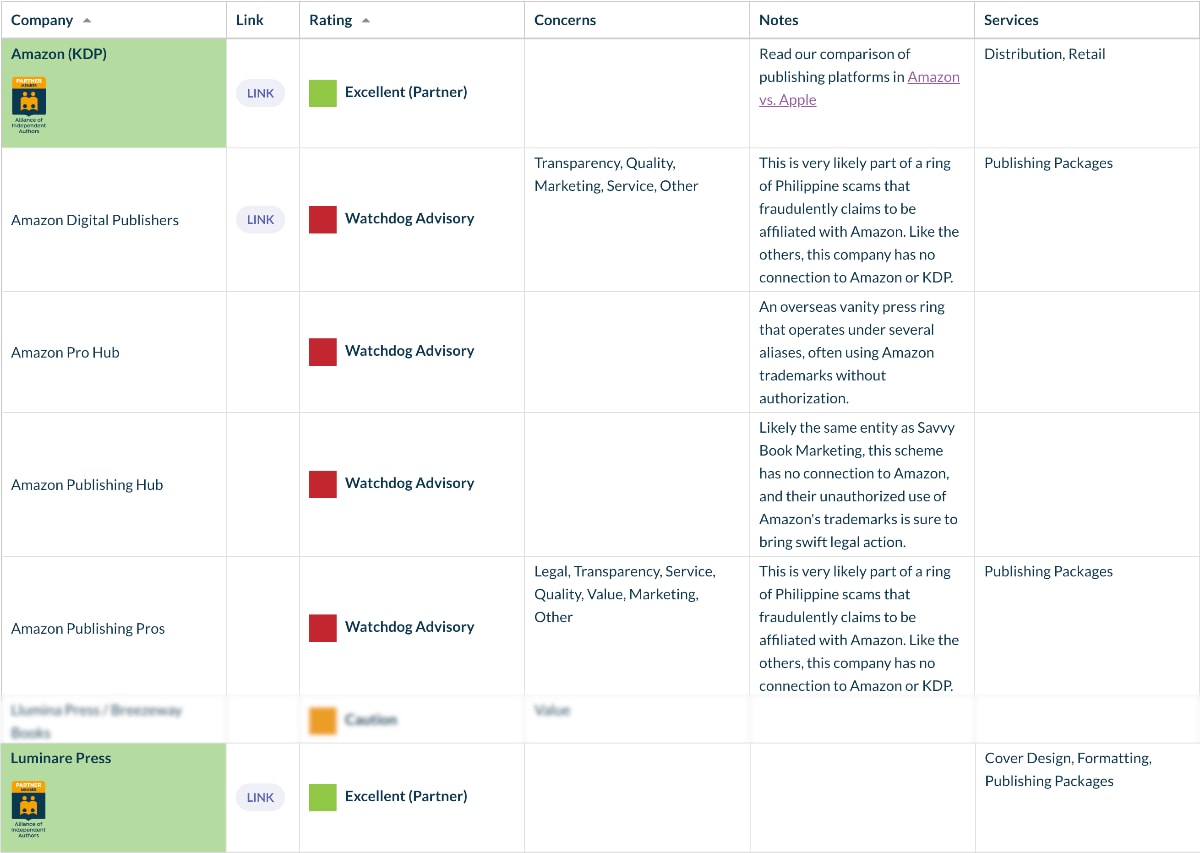Published: October 5, 2023
Once again, I’ve been hearing about more scams in the publishing world.
Here are a few things that have come across my desk:
- A company contacts a recently published author with an offer to make their book a bestseller. Sometimes these companies tell the author that Amazon recommended them. They offer to republish the book with a new cover, ISBN, and layout and promise to place it in large retail markets—even though the writer has just done all the work they are proposing.
- A company with “Amazon” in its name offers to set up a publishing consultation and gets you in the door for a reasonable fee, then keeps pressuring you for more and more money. Read more about this scam here and see our update at the end of this article.
- A company approaches you and offers to do a book trailer and get it into huge markets if only you’ll give them money, usually in the four figures. This can be in the guise of selling your book to a major studio.
Authors, it is essential to vet these companies before parting with your cash.
Though there are many legitimate publishing options out there, I suspect they are far outnumbered by shady groups who want to make a quick buck on you before disappearing.
How do you vet them?
- Start with googling the company name and the word “reviews” and see what comes up. Be sure you are looking at the reviews for the company you are actually searching for, as lots of names are similar. When you find reviews—through Yelp, Google, or social media—consider them as a whole. If there are one or two good ones but the rest are bad, take that into account, and vice-versa.
- Check the Alli (Alliance of Independent Authors) resource ratings page, Best and Worst Self-Publishing Companies. Not everyone will be listed here, particularly if they are a fly-by-night operation, but this list is a valuable resource.
- You can also search Writer Beware and see if there is any information available about the company you are considering.
- If you want to do some meta-level snooping, go to WhoIs and type in the URL. Check the date of the URL purchase. Luminarepress.com, for instance, was purchased in 2011. (We date our company a little earlier because it took some agonizing months to come up with a name lots of people can’t pronounce.) A recently purchased URL could indicate a legitimate company that is just getting started, but it could also indicate a hastily set up scam company, especially if the website is claiming to have published a huge number of books.

Most importantly, rely on your intuition and common sense, and bring a healthy dose of skepticism to the table.
Most importantly, rely on your intuition and common sense, and bring a healthy dose of skepticism to the table. We all dream of having our book become a bestseller or a blockbuster movie, but don’t fall for false flattery. If someone contacts you out of the blue, be very careful, especially if they are proposing something that sounds too good to be true. It probably is.
Most of these companies use the same sales techniques:
- Fake urgency: You need to decide on the spot because the deal/offer is going to expire soon. Breathe and take time. No publishing deal expires in a day!
- Fake competition: There are other authors in your genre they may choose instead of you. Publishing is not about speed or limiting the offer per genre, it’s often the opposite!
- Fake deals: Add more services right away to get a better deal. Resist the temptation, they are probably trying to sell you things you won’t need.
If you do follow through because the company seems legitimate, ask for a contract before you make and payment and review it carefully. Consider it a red flag if they tell you they don’t offer, or you don’t need, a contract. Another red flag is an urgent request for money. Very few scams ask for money in the first phone call. But when they put pressure on (and they will), run. Even if it seems to be a reasonable sum, once you send them money, they will be contacting you for more.
At Luminare Press, we know and respect legitimate competition. We’re not trying (or want) to work with every author who seeks help with publishing. We are aware that there are a lot of ways to publish a book and we always try to guide writers toward what works best for them in that moment. A robust marketplace, full of professional and specialized author services, benefits all writers who want to publish independently. But we hate it when companies rip authors off, whether they are our clients or not. We want authors to come out of the publishing experience with the best books ever, and to work with people who feel the same. Your words are too precious to be handed over to a company whose only goal is to take your money and run.
UPDATE – Novermber 1st
According to Publisher Weekly, Amazon started to sue companies falsely claiming an affiliation with Amazon Publishing and Kindle Direct Publishing that are scamming authors.
According to the suit, the scammers run fake Amazon knockoff websites designed to lure would-be authors into paying a fee to publish, and then deliver either substandard or no service at all.
Andrew Albanese, Publisher Weekly
Once again, be careful when companies contact you offering great deals, especially if their names include words like Amazon, AMZ, KPD, or famous traditional publishers (we spotted a company named Penguin definitely not affiliated with Penguin Random House). Feel free to contact us or schedule a consultation if you are looking for a reliable publisher.